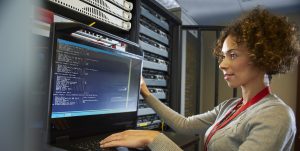The field of computer forensics is rapidly evolving, driven by the increasing complexity of cyber threats, advancements in technology, and the growing volume of digital data. One of the most significant future directions in computer forensics is the development of advanced tools and techniques that leverage artificial intelligence AI and machine learning ML. These technologies are expected to revolutionize the way forensic investigations are conducted by automating time-consuming tasks such as data sorting, pattern recognition, and anomaly detection. AI-powered tools can rapidly sift through vast amounts of data, identifying relevant evidence that would be difficult and time-consuming for human investigators to find manually. Machine learning models can also learn from previous investigations, improving their ability to detect sophisticated cyber threats and emerging attack patterns. This not only enhances the efficiency and accuracy of forensic analysis but also allows investigators to focus on more complex aspects of the case that require human judgment.

Another promising direction in computer forensics is the focus on cloud forensics, as more data and business operations migrate to cloud environments. The introduction to computer forensics are often inadequate for dealing with the unique challenges posed by cloud computing, such as data distributed across multiple locations, shared resources, and the dynamic nature of virtual environments. Future developments in cloud forensics will likely involve creating specialized frameworks and protocols that can effectively manage the complexities of cloud data acquisition, preservation, and analysis. This includes enhancing the ability to conduct remote forensics, where evidence is collected directly from cloud platforms without disrupting the services. Additionally, as cloud environments are often subject to various legal jurisdictions, future forensics will need to navigate these regulatory landscapes carefully, ensuring that evidence is collected in compliance with local and international laws.
Furthermore, the field of computer forensics is expected to expand into areas such as the Internet of Things IoT, block chain, and mobile forensics, reflecting the increasing digitization of everyday life. IoT forensics, for instance, will become crucial as smart devices generate massive amounts of data that can be relevant in investigations, from smart home devices to wearable technology. Forensics professionals will need to develop techniques to extract, analyze, and interpret data from these devices, often dealing with proprietary technologies and limited data storage capacities. Similarly, blockchain forensics is emerging as an essential field due to the rise of crypto currencies and decentralized applications, which are often used in cybercrimes like money laundering and fraud. The immutable and pseudonymous nature of blockchain transactions presents unique challenges, and future forensic methods will need to focus on tracing transactions and identifying patterns that link criminal activities.
